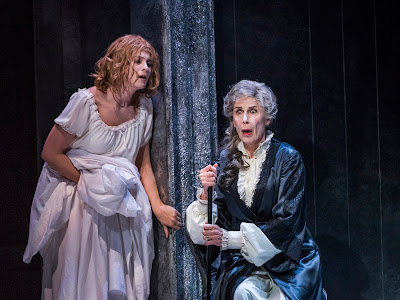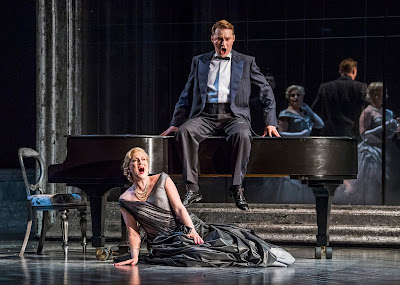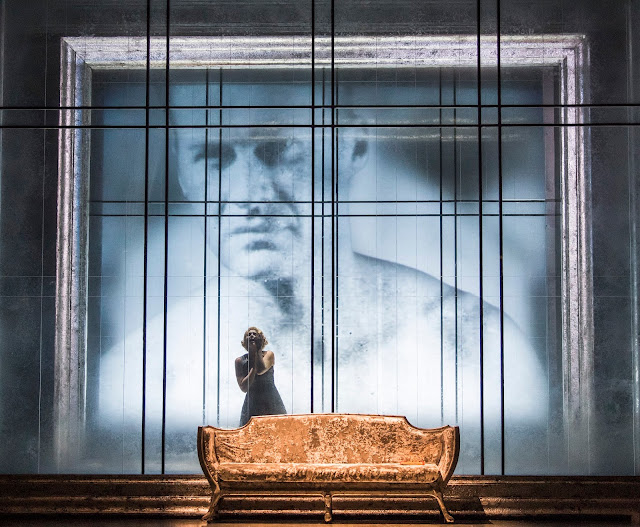 |
| Barber: Vanessa - Virginie Verrez, Emma Bell - Glyndebourne (Photo Tristram Kenton) |
Passionate performances and a complex, multi-layered staging in the first major UK production of Barber's romantic opera
 |
| Virginie Verrez, Rosalind Plowright - Glyndebourne (Photo Tristram Kenton) |
Vanessa seems to be having something of a moment, in 2016 there were productions at Santa Fe Opera (directed by James Robinson, conducted by Leonard Slatkin with Erin Wall, see my review) and at the Wexford Festival (directed by Rodula Gaitanou, conducted by Timothy Myers with Claire Rutter, see the review on Bachtrack) and now Glyndebourne. Menotti's libretto leaves a great deal unsaid, and each production took a different view. At Santa Fe, staged handsomely as Hollywood noir, the production did not dig very deep, whereas at Wexford the production brought out the Chekov-like overtones of the plot.
 |
| Emma Bell, Edgaras Montvidas - Glyndebourne (Photo Tristram Kenton) |
Mirrors are something a theme of the libretto, and Ashley Martin-Davis' set used these as the main theme, with huge frames which sometimes reflected and sometimes were transparent. Through these mirrors we could see action in other parts of the house, but also we could see the past as people remembered. The result was to create fascinating multi-layered visual imagery, so it was possible for Anatol and Erika to duet, yet still have Vanessa as a ghostly presence on stage.
The period was loosely the 1950s (the period of composition rather than the original setting of 1905), but Martin-Davis' costumes were relatively non-specific with stylistic of the 1930s too as if the household really was preserved in aspic.
By suggesting that Anatol is Vanessa's son, that the younger Vanessa and the Doctor had a flirtation separated by anti-miscegenation, and that Erika has an abortion, Warner provides a concrete backdrop to the torrent of emotions in the opera. It does not quite solve the opera's problems, the title role is still something of a mystery and everything remains somewhat overheated, but these suggested back stories give a remarkable complexity and depth to the resulting drama.
 |
| Rosalind Plowright, Emma Bell, Virgine Verrez, Edgaras Montvidas, Donnie Ray Albert - Glyndebourne (Photo Tristram Kenton) |
Perhaps, Erika is the larger and more significant role. Arguably she is the character who develops and changes. We saw Virginie Verrez as Erika in Santa Fe in 2016, and here she seemed to have developed her performance, creating an Erika who was burningly passionate yet intensely conflicted. Her account of Erika's refusal of Anatol's offer of marriage was powerfully projected, capturing the character's inner troubles. During this sequence, at the end of Act One, and when Erika rushes out into the snow at the end of Act Two, Warner's use of film created a visual metaphor for what was going on inside Erika's mind. Verrez sang the role with focussed intensity, and rightly made Erika the centre of attention, even when simply sitting rigidly still.
 |
| Emma Bell, Edgaras Montvidas Glyndebourne (Photo Tristram Kenton) |
Looking on was Rosalind Plowright's iron-backed Old Baroness. When she did speak, every word counted, and throughout the opera Plowright's eyes, facial expressions and rigid body language told us everything. In this production, it was clear that whilst the Old Baroness could see clearly what was happening in the present, she was also seeing and remembering the past, and perhaps introducing her own regret at how she had allowed the past to create the present.
Donnie Ray Albert was a wonderfully sympathetic Doctor, his fascinating relationship with Emma Bell's Vanessa in the present coloured by what we see of their relationship in the past and the knowledge of the problems this might cause. Albert tactfully suggested the layers, under the bluff exterior.
The smaller roles were well played, with William Thomas a a striking Major Domo and Romanas Kudriasovas as the Footman. The chorus has a small role, here expanded to create a suggestively disturbingly element in Act Two via Michael Barry's choreography.
The standard of English diction was very high, so that one could forget about the surtitles for whole sections and simply concentrate on the stage picture. A great testament to a cast which included two non-native English speakers.
Jakub Hrůša and the London Philharmonic Orchestra made Barber's richly passionate and complex score an extra character in the action. Hrusa played Barber's music for all it was worth, never neglecting the lush romanticism but also bringing in a surprisingly complex depth to it and some moments of real anger.
 |
| Barber: Vanessa - Virginie Verrez - Glyndebourne (Photo Tristram Kenton) |
Elsewhere on this blog:
- Wagner: Der Ring des Nibelungen, Tiroler Festpiele Erl (Austria) (★★★★) - Opera review
- Introducing the art of bel canto - the London Bel Canto Festival - Interview
- Prom 26: Late night Baroque queens at the Royal Albert Hall (★★★★) - concert review
- Into the mind of Bloody Mary: Martin Bussey & Di Sherlock's Mary's Hand (★★★½) - Opera review
- Suppleness and elegance: a new Les Pêcheurs de Perles from an all-French team (★★★★★) - CD review
- SWAP'ra gala at Opera Holland Park - concert review
- Enterprising rarity: Ethel Smyth's The Boatswain's Mate at Grimeborn (★★★½) - Opera review
- Spinto showcase: Angel of Fire from Katerina Mina (★★★½) - CD review
- Bernstein's problem child: a lively & engaging Candide at West Green House (★★★½) - Opera review
- Lucretia through a newcomer’s eyes and ears: Britten at the Grimeborn Festival (★★★½) - opera review
- Prom 17: Parry, Holst & Vaughan Williams (★★★★) - concert review
- Home











No comments:
Post a Comment